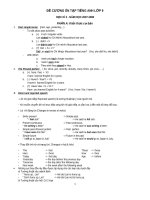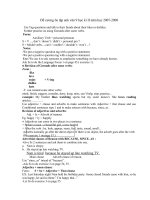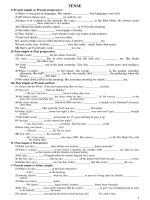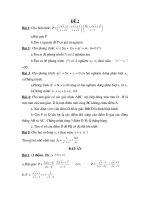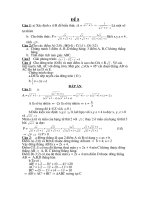Dap an on tap Anh 9 dot 6
Bạn đang xem bản rút gọn của tài liệu. Xem và tải ngay bản đầy đủ của tài liệu tại đây (66.02 KB, 9 trang )
<span class='text_page_counter'>(1)</span><div class='page_container' data-page=1>
<b>REVISION UNIT 1 TO UNIT 4 – ENGLISH 9</b>
<b>UNIT 1: LOCAL ENVIRONMENT</b>
<b>UNIT 2: CITY LIFE</b>
<b>UNIT 3: TEEN STRESS AND PRESSURE</b>
<b>UNIT 4: LIFE IN THE PAST</b>
<b>GV: NGÔ THỊ XUYÊN</b>
<b>I. TỔNG ÔN </b>
<b>UNIT </b> <b>TOPIC</b> <b>PHONETICS</b> <b>VOCABULARY</b> <b>GRAMMAR</b>
UNIT 1 <b>LOCAL </b>
<b>ENVIRONMEN</b>
<b>T</b>
STRESS ON CONTENT
WORDS
Traditional craft and
places of interest
- Complex sentences (1)
- phrasal verbs (2)
UNIT 2 <b>CITY LIFE</b> STRESS ON
PRONOUNS IN
SENTENCES
City life and adjectives - Comparison of
adjectives and adverbs
(3)
- Phrasal verbs (4)
UNIT 3 <b>TEEN STRESS </b>
<b>AND PRESSURE</b>
STRESS ON THE VERB
“BE” IN SENTENCES
Changes in
adolescence
- Reported speech (5)
- Question words
before “to” Infinitive
(6)
UNIT 4 <b>LIFE IN THE </b>
<b>PAST</b>
STRESS ON AUXILIARY
IN SENTENCES
Life in the past/
phrases with some
verbs
- Used to (7)
- Wish + past simple (8)
<b>GRAMMAR 1: COMPLEX SENTENCES (CÂU PHỨC): GỒM MỘT MỆNH ĐỀ CHÍNH VÀ 1 HOẶC NHIỀU </b>
<b>MỆNH ĐỀ PHỤ</b>
<b>1. DEPENDENT CLAUSES OF PURPOSES (MỆNH ĐỀ PHỤ CHỈ MỤC ĐÍCH): SO THAT/ IN ORDER THAT</b>
Ex: She learnt hard so that she could get the scholarship.
<b>2. DEPENDENT CLAUSES OF REASON (MỆNH ĐỀ PHỤ CHỈ LÍ DO): BECAUSE/ SINCE/ AS</b>
Ex: She didn’t go to school since she was ill.
<b>3. DEPENDENT CLAUSES OF TIME (MỆNH ĐỀ PHỤ CHỈ THỜI GIAN): WHEN/ WHILE/ AFTER/ BEFORE/ AS </b>
<b>SOON AS,..</b>
</div>
<span class='text_page_counter'>(2)</span><div class='page_container' data-page=2>
<b>4. DEPENDENT CLAUSES OF CONCESSION (MỆNH ĐỀ PHỤ CHỈ SỰ NHÂN NHƯỢNG): THOUGH/ </b>
<b>ALTHOUGH, EVEN THOUGH</b>
Ex: Although I learnt hard, I didn’t get high grades.
<b>GRAMMAR 2: PHRASAL VERBS</b>
<b>COMMON PHRASAL VERBS</b>
- carry on, carry out
- look into (điều tra)/ look up to (tôn trọng)/ look down on (xem thường)/ look after (chăm sóc)
- put off (trì hỗn), put through (nối máy), put out (dập lửa)
- turn up (xuất hiện, tăng âm thanh), turn down (từ chối, giảm lượng âm thanh)
- see off (tiễn),
<b>GRAMMAR 3: COMPARISONS</b>
<b>1. EQUALITY (SO SANH NGANG BẰNG)</b>
<b>Form 1: S + be/ V + as adj/ adv + as + noun/ pronoun</b>
Ex: He is as tall as his father.
<b>Form 2: S + V + the same as + noun/ pronoun</b>
Ex: He is the same height as his father
<b>Form 3: S1 be like S2</b>
Ex: Her house is like your house.
<b>2. COMPARATIVE (SO SÁNH HƠN)</b>
<b>Form 1 (TÍNH TỪ HOẶC TRẠNG TỪ NGẮN): S + be/ V + adj/ adv – ER + THAN + noun/ pronoun</b>
Ex: He is taller than his father.
Form 2: (TÍNH TỪ HOĂC TRẠNG TỪ DÀI): S + be/ V + MORE/ LESS adj/ adv + THAN + noun/ pronoun
Ex: This computer is less expensive than that one.
<b>Form 3: (SO SÁNH CÀNG CÀNG): The COMPARATIVE (S- V), the COMPARATIVE (S- V).</b>
Ex: The more, the merrier.
</div>
<span class='text_page_counter'>(3)</span><div class='page_container' data-page=3>
<b>1. CHUYỂN ĐỔI THÌ: LÙI MỘT THÌ</b>
<b> NGOẠI LỆ: Khi thơng tin là sự thật hiển nhiên thì khơng lùi thì</b>
<b>2. CHUYỂN ĐỔI KHÁC</b>
<b>- THAY ĐỔI ĐẠI TỪ NHÂN XƯNG</b>
<b>- THAY ĐỔI TRẠNG TỪ CHỈ KHÔNG GIAN VÀ THỜI GIAN</b>
<b>- THAY ĐỔI KHI CÂU TRỰC TIẾP LÀ CÂU MỆNH LỆNH, CÂU HỎI CÓ CHỨA TỪ ĐỂ HỎI, CÂU HỎI YES-NO</b>
Ex1 : “Stand up, please!”, the teacher said to us.
The teacher told us to stand up.
Ex2: “Where do they live?”, she asked.
She asked where they lived.
Ex2: “Do you want to drink beer or wine?”, the waiter asked.
The waiter asked me whether I wanted to drink beer or wine.
<b>GRAMMAR 6: QUESTION WORDS BEFORE “TO” INFINITIVES</b>
<b>FORM : </b> <b>S - V - (0) - WHAT/ WHERE/ WHEN/ HOW/ WHICH … TO VERB INFINTIVE </b>
Ex: I don’t know what to do.
Can you show me how to use this?
<b>GRAMMAR 7: USED TO (TỪNG LÀM GÌ)</b>
<b>FORM: </b> <b>S USED TO V INFINITIVE / THERE USED TO BE …</b>
<b>S DIDN’T USE TO V INFINITIVE / THERE DIDN’T USE TO BE …</b>
<b>WH-QUESTION DID S USED TO V INFINITIVE?</b>
Ex: I used to walk to school.
He didn’t use to smoke.
What did there use to be in the house?
</div>
<span class='text_page_counter'>(4)</span><div class='page_container' data-page=4>
Ex: I wish I were rich.
<b>II. LUYỆN TẬP (PRACTICE)</b>
<b>Exercise 1: Choose the word whose main stressed syllable is different from the rest. Circle the</b>
<b>corresponding letter A, B, C or D.</b>
1. A. vulnerable B. satellite C. eleven D. element
2. A. character B. publisher C. wonderful D. understand
3. A. interesting B. surprising C. amusing D. successful
4. A. arctic B. behave C. event D. facility
5. A. illiterate B. occasion C. relaxed D. sculpture
Exercise 2: Choose the answer that best matches the meaning of the word or phrases.
1. She got a new job offer, but she turned<b> it down .</b>
a. accepted b. refused c. took d. agreed
2. My two kids do not get on well with each other at times.
a. are not happy b. are very happy c. do not fight d. do not talk
3. Please turn the radio up? I can’t hear it.
a. make louder b. make softer c. stop using d. stop playing
4. We set off early in the next morning.
a. started the journey b. got out of bed
c. arrived at the destination d. finished the trip
5. Artisans from this village always try to keep up with their counterparts in other traditional craft
villages.
a. stay equal with b. learn from c. talk to d. keep track of
6. Mi asked what information she __________that assignment.
a .needs to be done b. needed doing c. need to do d. needed to do
7. My parents asked me to find out _______________it gave you so much trouble.
</div>
<span class='text_page_counter'>(5)</span><div class='page_container' data-page=5>
8. I am not sure ______________I can solve this problem.
a. how b . what c. who d. by whom
9. In the past, white, or violet ao dai _______by Vietnamese female students as their uniforms.
a. wore b. used to wear c. was worn d. would be wear
10. We all wish there _____________a smart board in our classroom.
a. is b. were c. has been d. had been
<b>Exercise 3: Supply the correct form of the word.</b>
1. These ________ live mainly on farming and making incenses when crops are over. (village)
2. With the advent of the festival in the city, ___________ boomed in May last year. (tourist)
3. These fully __________ craftsmen amazed me with their products. (talent)
4. Sydney, located in state of New South Wales, Australia, is a city of national and _____________
diversity. (culture)
5. There are many places of ________________ in Hanoi that I am sure I can see them all. (interesting)
<b>Exercise 4: Read the following passage and do the tasks. </b>
<b>LIFE IN THE PAST VS LIFE IN THE PRESENT</b>
Over the last century, there have been many significant changes in the way we live. Obviously, it is
difficult to compare the life of ancient people and the life of the people living in the twenty-first century
because so many changes have occurred. Even the changes that have occurred over the last ten years
are amazing.
</div>
<span class='text_page_counter'>(6)</span><div class='page_container' data-page=6>
friend who is on the other corner of the world because we are connected 24/7. Nevertheless, people
had better relationships with the neighbors in years gone by.
All things considered, it is an obvious conclusion that life has changed significantly during the course
of history. In some ways, it is definitely easier to live in the present. On the other hand, however, life now
is much faster and stressful than it used to be in the past. The standard of living has definitely improved
but it can be discussed whether the quality of our lives is also better.
<b>Task A. Decide whether the following sentences are true (T) or false (F).</b>
1. Life nowadays is the same as life of our ancestors.
2. Technology has made our lives easier.
3. In the past, household appliances were very expensive.
4. Public schools allowed females and males to be educated in the same schools.
5. We can use the internet to communicate with people around the world.
<b>Task B. Answer the questions.</b>
1. Is life today faster or slower than life in the past?
_______________________________________________________________
2. What has happened to the standard of living?
_______________________________________________________________
3. What makes it easy to access information?
_______________________________________________________________
4. Who of what does some difficult jobs for us?
_______________________________________________________________
5. What makes our lives easier at home?
</div>
<span class='text_page_counter'>(7)</span><div class='page_container' data-page=7>
<b>Exercise 5: Read the text then choose the correct answers.</b>
Practical stress management can help students deal with their worries and become more productive,
competent and efficient. First of all, students must be able to design and stick to a timetable. Choose a
relaxing break between work and study, even if it’s just taking out time to breathe. In addition, a healthy
lifestyle is essential for students. Let’s drink more water as well as take out time to get some air and
exercise. Furthermore, organization is very important in academic life for dealing with stress. By keeping
academic notes organized, turning in assignments on time, and keeping track of all deadlines, stress can
be reduced to a great extent. Stress can also get worse if a person feels lonely. Therefore, by letting out all
your thoughts to someone you trust, you immediately feel a lot better. However, if you feel extremely
stressed out, take a break and do something you love. Whether it is painting or listening to music, doing
something you enjoy can cheer up your mood and distract you from a stressor. It’s about time that we
students accept that we can achieve just as much in life without all the stress.
1. Practical stress management can help students_________________.
a. deal with stress b. have more time
c. face up to the worst situation d. think critically
2. What should students pay attention to when designing a timetable?
a. They have to arrange time to breathe. b. They need to set time for relaxation.
c. They don’t need to take notice of certain tasks. d. They should stop working and studying.
3. What can students do to lead a healthy lifestyle?
a. Visit their doctor as scheduled.
b. Not to put much pressure on time management.
c. Follow the timetable strictly.
d. Go outside for fresh air, do regular exercises and drink more water.
4. Why is organization important in academic life?
a. Because it can help students get good grades. b. Because it is a must for all students.
c. Because it can help students reduce stress. d. Because it leads to better results.
5. Which of the following sentences is true?
</div>
<span class='text_page_counter'>(8)</span><div class='page_container' data-page=8>
6. What should you do when you are feeling stressed?
a. Take time for reflection on your progress. b. Ease your soul and your mind.
c. Stay away from other people. d. Take a break and do what you enjoy.
<b>Exercise 6: Write the sentences using the words given. </b>
1. Henry needs to learn English. I will teach him. (as)
_____________________________________________________________________________________
2. It was raining outside. We went for a walk. (even though)
_____________________________________________________________________________________
3. It was raining hard. They could not work in the fields. (so…. that)
_____________________________________________________________________________________
4. He bought a jeep. His friend advised him against it. (although)
_____________________________________________________________________________________
5. We arranged to meet in front of the lantern shop at 8, but she never arrived. (turn)
_____________________________________________________________________________________
6. The artisans in my village can earn enough money from basket weaving to live. (live on)
_____________________________________________________________________________________
7. He thinks no language in the world is more difficult than Chinese.
He thinks Chinese is __________________________________________________________
8. He is the tallest boy in his class.
No one in ___________________________________________________________________
9. She sings better than anybody else in the class.
She is _______________________________________________________________________
10. They’re not sure how they should operate the new system. (TO)
They are not sure how ____________________________________________________
<b>PHẦN GIẢI ĐÁP – ANSWER KEYS – GV NGÔ THỊ XUYÊN</b>
<b>Exercise 1: </b> <b>1C 2. D 3. A 4. A 5. D</b>
</div>
<span class='text_page_counter'>(9)</span><div class='page_container' data-page=9>
<b>Exercise 3: </b> <b>1. villagers 2. tourism 3. talented 4. cultural </b> <b>5. interest </b>
<b>Exercise 4: </b> <b>Task A. 1. F </b> <b>2. T</b> <b>3.T</b> <b>4. F</b> <b>5.T</b>
<b>Task B: 1. Life today is faster than life in the past</b>
<b>2. the standard of living has improved</b>
<b>3. the Internet (makes it easy to access information)</b>
<b>4. computers and other powerful machines (do some difficult jobs for us).</b>
<b>5. Household appliances make our lives easier at home.</b>
<b>Exercise 5: </b> <b>1.a </b> <b>2.b </b> <b>3.d 4.c</b> <b>5.c </b> <b>6.d</b>
<b>Exercise 6: 1. As Henry needs to learn English, I will teach him. </b>
<b>2. Even though it was raining outside, we went for a walk. </b>
<b>OR: We went for a walk even though it was raining outside</b>
<b>3. It was raining so hard that they could not work in the fields. </b>
<b>4. He bought a jeep although his friend advised him against it. </b>
<b>5. We arranged to meet in front of the lantern shop at 8, but she never turned up.</b>
<b>6. The artisans in my village can live on basket weaving</b>
<b>7. He thinks Chinese is the most difficult language in the world</b>
<b>8. No one in the class is taller than him</b>
<b>9. She is the best singer in the class.</b>
</div>
<!--links-->
